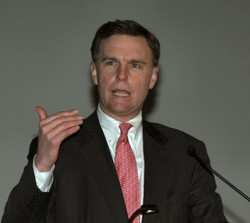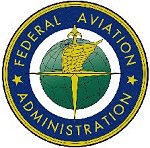Questions Push To Change NAS Funding Methods
 Unless you recently napped with Rip
Van Winkle, you probably know about the looming battle over future
FAA funding. Players on all sides are sharpening their tongues and
quills in preparation.
Unless you recently napped with Rip
Van Winkle, you probably know about the looming battle over future
FAA funding. Players on all sides are sharpening their tongues and
quills in preparation.
Wednesday, National Business Aviation Association (NBAA)
President and CEO Ed Bolen (right) fired off a missive
expressing concern over comments made by FAA Administrator Marion
Blakey regarding the issue.
"Some of the things said by the Administrator seemed at odds
with decades of funding experience and FAA's own information,"
Bolen said.
Blakey's comments came in response to questions raised at a
National Press Club news conference Tuesday when she spoke about
anticipated changes in aviation system funding this year in
conjunction with the coming FAA "reauthorization."
The FAA pays most of its bills from the aviation trust fund
which is a congressional construct intended to keep the nation's
aviation system running. The trust fund is periodically
reauthorized by the congress -- lawmakers decide who pays what into
the trust fund to keep it in the black.
Data on the FAA's website shows the trust fund's uncommitted
balance has dwindled from a high in 2001 of around $7.3 billion to
just under $2 billion in 2005 blaming the drop on rising cost and
decreasing revenues.
Currently, the fund is kept flush with taxes on various
activities including passenger tickets, passenger flight segments,
international arrivals/departures, cargo waybills, aviation fuels,
and frequent flyer mile awards from non-airline sources like credit
cards.
The FAA has taken the position more aircraft in the system --
due in part to the proliferation of low-cost carriers and what the
FAA says is a 60 percent increase in the number of business
aircraft -- has increased the FAA's workload without generating
more revenue. Blakey has said FAA income based on ticket taxes is
dropping because of the lower fares charged by airlines.

The FAA argues it should charge for its services
based on use and has suggested the best means of doing so would be
a "user fee" system whereby each user pays for the particular
service rendered -- get a weather brief, file a flight plan, apply
for a new certificate, etc.
Bolen questioned Blakey's position on the matter
arguing the fuel tax is already an ideal method of tying payment
for service to system use.
"The general aviation fuel tax is a very simple,
accurate and efficient way to tie revenues to costs," Bolen said.
"GA fuel taxes reflect how much people fly -- the more you fly, the
more fuel you burn, the more taxes you pay. However, they don't
involve complicated formulas, require a big bureaucracy or turn the
FAA Administrator into a tax czar. It is difficult to imagine a
better funding mechanism."
Bolen also was troubled by the Administrator's
contention that aviation system funding lacks "equity." Airlines
argue they pay too much compared to general aviation users. The FAA
says over half of its revenues come from ticket taxes, and the
airlines argue that's unfair. They say general aviation aircraft
are using the same system and each should pay an equivalent amount
for the services they receive.
 "The last FAA cost
allocation study that focused on the cost each segment imposes on
the system concluded that general aviation is responsible for
something like 8 percent of total system costs. That is roughly in
the ballpark of what the GA community is paying today," said Bolen.
"For over a year, NBAA has repeatedly asked the Administrator to
discuss with us any updated information the Agency may have on this
issue, but those requests have been denied."
"The last FAA cost
allocation study that focused on the cost each segment imposes on
the system concluded that general aviation is responsible for
something like 8 percent of total system costs. That is roughly in
the ballpark of what the GA community is paying today," said Bolen.
"For over a year, NBAA has repeatedly asked the Administrator to
discuss with us any updated information the Agency may have on this
issue, but those requests have been denied."
There's no question in which direction the FAA is
leaning when it comes to future funding for its trust fund... the
agency clearly wants to institute a system of user fees. The NBAA,
the AOPA and other organizations representing general aviation are
obviously unhappy about that and are urging their memberships to
get involved.
"The businesses and communities across the country
that rely on general aviation should be very concerned about the
latest comments from the FAA," Bolen concluded. "We hope the
Administrator will revisit these issues before the FAA
reauthorization proposal is submitted to Congress."
 Aero-News: Quote of the Day (04.28.25)
Aero-News: Quote of the Day (04.28.25) ANN's Daily Aero-Term (04.28.25): Decision Altitude (DA)
ANN's Daily Aero-Term (04.28.25): Decision Altitude (DA) ANN's Daily Aero-Linx (04.28.25)
ANN's Daily Aero-Linx (04.28.25) Airborne-Flight Training 04.24.25: GA Refocused, Seminole/Epic, WestJet v TFWP
Airborne-Flight Training 04.24.25: GA Refocused, Seminole/Epic, WestJet v TFWP Aero-News: Quote of the Day (04.29.25)
Aero-News: Quote of the Day (04.29.25)





